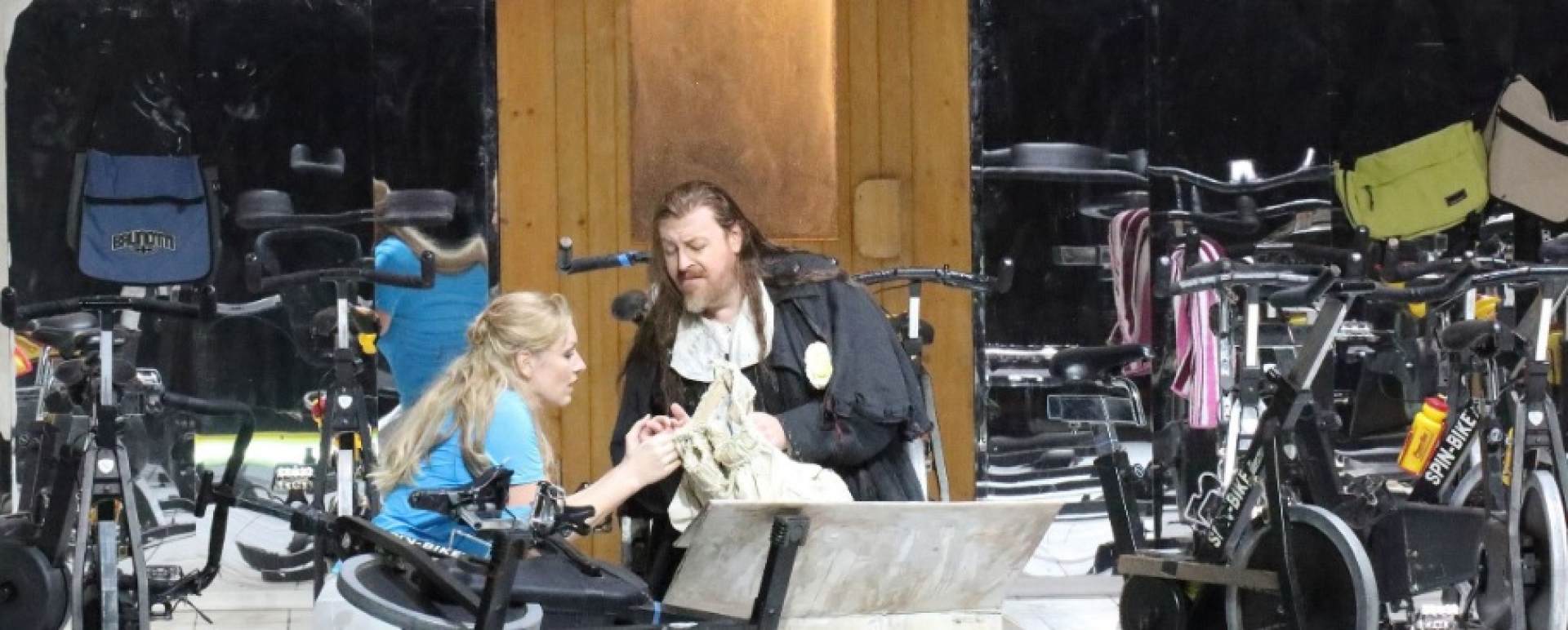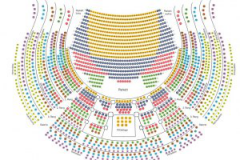The Flying Dutchman
March 2025 | ||||||
|---|---|---|---|---|---|---|
Mo | Tu | We | Th | Fr | Sa | Su |
Composer Richard Wagner. Libretto by the composer.
Romantic opera in three acts (1843)
recommended for 12 years and older
In German. With English and German surtitles.
Every seven years the Dutchman is allowed back on land. There this tepest-tossed creature can only be redeemed by a woman, otherwise his endless odyssey continues. Will Senta be that woman? After all, she longs to break free from the confining world of her father. All he ever thinks about is money. Isn't the wealthy Dutchman just what the doctor ordered? Wagner's gripping early work: a psycho-thriller of operatic literature. Peter Konwitschny has already provoked audiences to delight and disgust with his spectacular Parsifal and Tristan und Isolde productions. This Munich Holländer is something you just "have" to see. A sea and see journey on the waves of the orchestra.
Act One
The vessel of the Norwegian merchant Daland has run into a severe storm shortly before reaching harbour and drops anchor in the little cove of Sandwike on the Norwegian coast. Daland decides to wait for the storm to abate and sends the crew to get some rest. Only the steersman is left to keep watch on deck. He, however, is also soon overcome by sleep and does not notice the mysterious things which are happening around him.
A second ship approaches. The captain goes ashore. It is the Flying Dutchman, who bemoans his fate: he had once wanted to sail around a cape in a furious gale and sworn that he would accomplish this feat even if he had to keep on sailing forever. The devil took him at his word and condemned him to sail the sea until Judgement Day. The only hope he has of being saved from this terrible fate is if an angel were to intercede for him: every seven years the Dutchman can go ashore. If he manages to find a woman who will redeem him by promising to love him forever, the curse will be broken and he will be able to die.
Daland discovers the strange vessel and its captain. The Dutchman asks him if he might be his guest for a while. The merchant is happy to agree when he learns of the treasures this mysterious man offers him in return. He is also willing to give his daughter’s hand in marriage to the Dutchman when the latter asks his permission to woo her.
Meanwhile the storm has subsided and the wind has changed direction. The sails are quickly hoisted and Daland sails away, the Dutchman following him.
Act Two
Unlike the girls around her, Daland’s daughter Senta is absorbed in dreamy contemplation of the Flying Dutchman, whose portrait she has with her always. The girls tease her about this. Tired of listening to their silly teasing, Senta sings them the ballad of the Flying Dutchman, finally proclaiming that she is the woman who will deliver the condemned sailor from his curse with her love. At that moment Erik, who has loved Senta for a long time, enters. He brings news of the return of Senta’s father. The girls set off quickly to greet the sailors.
Erik pleads with Senta to ask her father for his consent to their marriage. She, however, tries to make him understand that the fate of the Flying Dutchman affects her more deeply than his pleas. As a warning, Erik tells her of his dream in which Senta meets a stranger, a weird sailor. Senta interprets this as a sign that her secret wish will be fulfilled.
Daland and the Dutchman enter. The father introduces his daughter to the stranger whose wife she is to become. He shows her the Dutchman’s treasures to convince her that she is making a good match. He then leaves the two of them alone.
Senta and the Dutchman are immediately attracted to each other and realise that they have each found the answer to their deepest longings in the other. Although the Dutchman warns Senta not to underestimate the sacrifice she is making for him, she is determined to become his wife and swears to be faithful to him until death.
Daland returns and invites them both to join in the celebrations with the sailors, at which he plans to announce Senta’s betrothal to the Dutchman.
Act Three
The Norwegians taunt the weird crew of the Dutch vessel, who do not want to take part in the celebrations. Finally the Dutch sailors retaliate, and everybody flees to escape the violence of their reaction.
Erik pleads with Senta but she does not respond to his reproaches. He reminds her of how she once said she loved him, which made him believe she would always be faithful. The Dutchman overhears this conversation and can no longer believe Senta truly means to keep her promise to him. Without giving her the chance to explain, the Dutchman turns to leave. In an act of despair, Senta confirms her pledge of fidelity.
Program and cast
Duration is 2 hours 15 minutes
Conductor: Mikko Franck
Production: Peter Konwitschny
Set Design: Johannes Leiacker
Lighting: Michael Bauer
Dramaturgy: Werner Hintze
Choruses: Christoph Heil
Daland: Franz-Josef Selig
Sit down: Asmik Grigorian
Erik: Benjamin Bruns
Mary: Natalie Lewis
The helmsman: Tansel Akzeybek
The Dutchman: Gerald Finley
Bavarian State Orchestra
Chorus and extra chorus of the Bayerische Staatsoper
Extrachorus of the Bavarian State Opera
National Theatre Munich
The National Theatre Munich (German: Nationaltheater München) is an opera house in Max-Joseph-Platz in Munich, Germany. It is the home of the Bavarian State Opera and the Bayerisches Staatsballett(Bavarian State Ballet).
The Bavarian State Opera also performs in the Prinzregententheater, which opened in 1901 and, like the Bayreuth Festspielhaus, is built to Richard Wagner's specifications, and in the Cuvilliés Theatre at the Residenz, constructed in 1751–1753 and described by Thierry Beauvert as "a Rococo gem".
The Nationaltheater is very easy to get to both by car and by MVV public transportation.
By MVV public transportation
S-Bahn: S 1 - 8 Marienplatz
U-Bahn: U 3, 6 Marienplatz, U 3 - 6 Odeonsplatz
Bus: 52, 131 Marienplatz, 100 Odeonsplatz
Straßenbahn: 19 Nationaltheater
On the day of the performance, holders of regular tickets are entitled to use public transport provided by the Münchner Verkehrsverbund (MVV). This service starts at 3 pm respectively three hours before the performance commences and ends with the closing hour of the MVV.
By Car
Take the Altstadt-Ring to Maximilianstraße.
Parking garage Max-Joseph-Platz: open Monday to Sunday from 6:00 A.M. to 2:00 A.M.
You can take advantage of the special theatre parking fee of Euro 10,- from 6:00 P.M. to 8:00 A.M. by presenting your admission tickets.

 EN
EN DE
DE IT
IT FR
FR ES
ES RU
RU JP
JP RO
RO
 Seating plan
Seating plan 